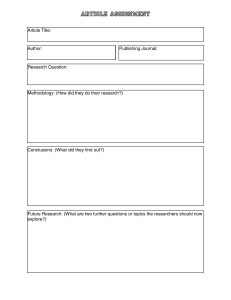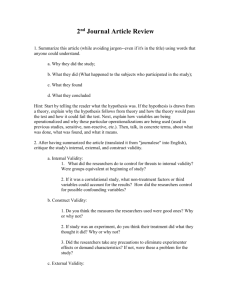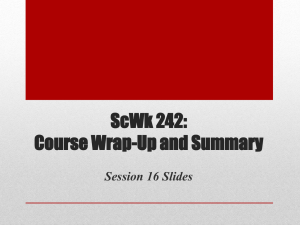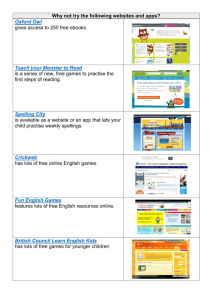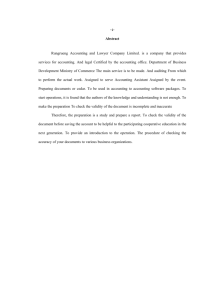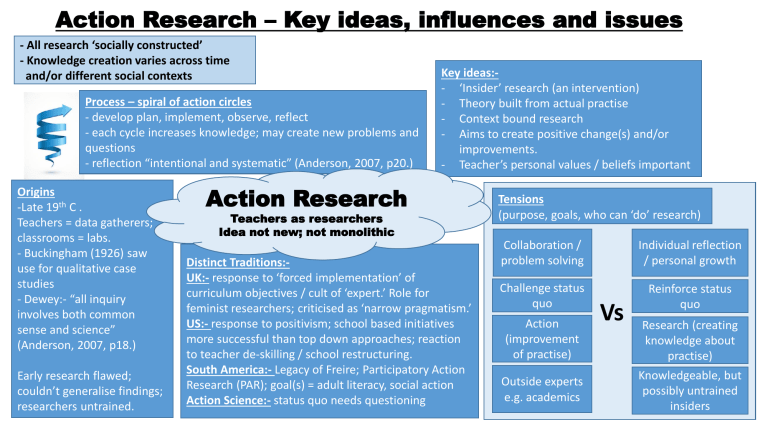
Action Research – Key ideas, influences and issues - All research ‘socially constructed’ - Knowledge creation varies across time and/or different social contexts Process – spiral of action circles - develop plan, implement, observe, reflect - each cycle increases knowledge; may create new problems and questions - reflection “intentional and systematic” (Anderson, 2007, p20.) Origins -Late 19th C . Teachers = data gatherers; classrooms = labs. - Buckingham (1926) saw use for qualitative case studies - Dewey:- “all inquiry involves both common sense and science” (Anderson, 2007, p18.) Early research flawed; couldn’t generalise findings; researchers untrained. Key ideas:- ‘Insider’ research (an intervention) - Theory built from actual practise - Context bound research - Aims to create positive change(s) and/or improvements. - Teacher’s personal values / beliefs important Action Research Teachers as researchers Idea not new; not monolithic Distinct Traditions:UK:- response to ‘forced implementation’ of curriculum objectives / cult of ‘expert.’ Role for feminist researchers; criticised as ‘narrow pragmatism.’ US:- response to positivism; school based initiatives more successful than top down approaches; reaction to teacher de-skilling / school restructuring. South America:- Legacy of Freire; Participatory Action Research (PAR); goal(s) = adult literacy, social action Action Science:- status quo needs questioning Tensions (purpose, goals, who can ‘do’ research) Collaboration / problem solving Individual reflection / personal growth Challenge status quo Reinforce status quo Action (improvement of practise) Outside experts e.g. academics Vs Research (creating knowledge about practise) Knowledgeable, but possibly untrained insiders Action Research – Implications for practise Teachers need to think about possible issues the new knowledge they create may cause Process:- Teachers need to be aware of the problems “intentional and systematic” reflection may cause (Anderson, p20.) e.g. teachers need to decide how ‘critical’ they really want their reflection to be. Process:- Teachers need to be aware of the spiral process and accept that, rather than solving a problem they may find even more issues that need to be investigated Political issues:Teachers need to know that no research can be apolitical. Some research may encounter resistance. Teachers need to be aware of the risks of doing research in their context. Influence of values /Beliefs Teacher’s need to aware of the importance of their personal values and beliefs and need to understand how these are likely to influence their research process Action Research Implications for practise Chance to test / make theory Teachers should be aware of the huge opportunity they have to test their ideas and/or create new ones. Tensions:- Teachers need a clear purpose, and goals and need to decide whether / how much:- they prioritise an individual approach over more collaborative ones - they wish to challenge the status quo - they are interested in improving their practise through action, versus improving their own knowledge about it - they want to change / use their voice and what problems this may cause - Their ideas are realistic and able to be done within their teaching context Teachers need to use ‘science’ Teachers need training to understand and use what Dewey called ‘science’ (probably academic literature etc.) not just their common sense. Generalising findings Teachers need to be aware of whether their findings are likely to be able to be applied to other pupils, classes or contexts. Quality in Action Research - issues Traditional division in research Quantitative Validity (stats.) Vs How trustworthy are inferences? Qualitative Trustworthiness Action research different as ‘insiders’ affect their context Debate:Is action research serious research ? Research validity / trustworthiness related to purpose and context. Academic notions of validity little use to action researchers (Anderson, 2007, p39.) Researchers need to find suitable criteria for their work. 5 suggestions Insider / outsider boundary unclear Teachers may be trained researchers; Academics may be formers teachers. External validity Can findings be applied to other Uni. research generalised contexts? and disseminated Schools vs Unis. Teachers find downwards. Action Different norms, academic research is bottom up, working practises, research and used in the context it knowledge research theoretical, was produced in. culture not related to Action research’s 2nd class Transferabiliy? their context. status shown by distinctions; Naturalistic formal (research) vs practical generalisation; role Workability? (school) knowledge, of formal vs BUT what separation of research from personal works where? practice and use of phrases knowledge; like ‘practical enquiry.’ narratives vs stats. Issues Outcome validity:– can deepen understanding of and/or solve a problem - Implies successful outcome BUT successful for whom? - May lead to reframing of problem / new problem(s.) Process validity:– can frame problem in a way that encourages ongoing reflection on / learning about individuals / systems - Triangulation, ensures range of perspectives, data and/or methods; - Empirical standards for narratives BUT narratives can be faked Democratic validity:– can do research in collaboration with all stakeholders - Ethical / social justice issue e.g. does teachers research benefit some stakeholders but not others? - Students benefit from being involved in research - local validity; solutions fit local context BUT what is a ‘relevant’ solution? Catalytic validity:– extent to which research “energizes participants towards knowing reality in order to transform it” (Latham 1986, p272, cited in Anderson, 2007, p42.) - Everyone involved in research deepens their understanding of socialreality and moves to transform and/or support it - Researchers use journals to document /monitor change Dialogic validity:– similar to an informal peer review -Researchers acknowledge and examine beliefs, values, experience and biases. -critical friends used to help researchers reflect / validate research claims Quality in Action Research - Politics of Action Research Quality in Action Research implications for practise How to validate research? Teachers need think carefully about how to validate their research:- which criteria to use - whether their methodologies, data collection and analysis techniques will be appropriate - who makes a suitable ‘critical friend.’ - what impact their role, teaching context, values and beliefs will have on their research - Whether their research is likely to have ‘transcontextual credibility.’ All research political Affects and is affected by context (schools part of political context) Critiquing profession a political move Action research allows teachers to expand, redefine and control their role. Micropolitics Schools are social institutions. Everyday struggles e.g. staffroom moans often about micro-political issues. Changes in power relations Administrators may feel threatened by possible effects of research (Anderson, 2007, p50.) ‘Dynamic conservatism’ (Schon, 1971, cited in Anderson, 2001, p50.) social institutions resist change. Schools hierarchical; have formal power structures; schools value “individual effort, professional isolation and conformity.” (Anderson, 2007, p50.) Politics in Action Research Teacher autonomy Action research holistic Difficult to separate from context (and its politics) Who creates / assigns value to educational knowledge? - Ed. Knowledge creation, problem definition; outside ‘experts Vs teacher researchers - Conflict‘ scientific’ vs nuanced personal knowledge. General ‘whole school’ / best practise models Vs local teacher led research - Role of subjugated knowledge Should teachers help young people re-create society or just adapt to it? Should teachers become involved in social issues? e.g. social justice; challenging status quo Politics in Action Research implications for practise Teachers need to:- accept that they cannot be ‘apolitical.’ - be prepared to encounter resistance to their research / ideas - accept their notions of ‘professionalism’ and ‘competence’ may be challenged - be sensitive to research stakeholders e.g. parents, students - accept that what works in their context may not work elsewhere
